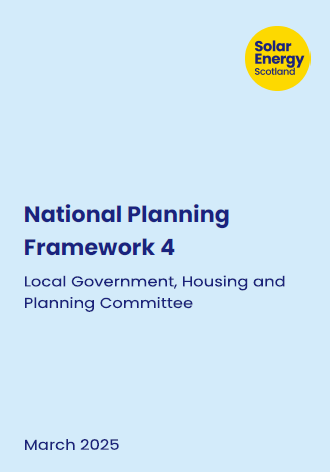Solar Energy Scotland welcomes the opportunity to provide feedback on the Local Government, Housing and Planning Committees review of the Fourth National Planning Framework (NPF4). We strongly support its emphasis on climate and environmental goals and believe it has largely delivered on its objectives. However, we see the need for greater improvements to truly accelerate progress and keep Scotland on its 2045 net zero trajectory.
Despite being a national framework, NPF4’s application has varied across different levels of decision makers, from Scottish Government and Local Planning Authorities. A key challenge is the inconsistent application of NPF4 by local planning authorities, where subjective interpretations are being applied in a manner that deviates from national guidance. Misinformation, especially around solar technologies has contributed to this issue. Key areas of misinformation include solar and biodiversity, food security, and land use.:
Well-designed and well-maintained solar farms can enhance biodiversity, supporting the delivery of Policy 3 of the NPF4).
Solar farms do not threaten food security, the biggest threat to food security is climate change. They offer farmers an opportunity to diversify their income without compromising their ability to farm.
Solar farms require a small amount of land in Scotland. To reach Scotland’s net-zero targets, a minimum of 4-6 GW of solar capacity will need to be built by 2030. Approximately 3.5 GW of capacity will come from ground mounted solar farms, which would require only 0.08% of Scotland’s total land area.
To fully accelerate the consenting process and proper implementation of NPF4, resource gaps within planning departments and statutory consultees must be addressed. This could be achieved by securing additional funding for training and upskilling officers in Local Planning Authorities (LPAs) and statutory consultees to ensure they have the necessary expertise and resources to make informed decisions on solar planning applications.
Solar farms provide various benefits to the community. Alongside its primary function of delivering clean green energy, they can also support local economies through job creation, increase biodiversity, support agricultural businesses and provide education opportunities for local schools and community groups.
Please see our response in detail below.

